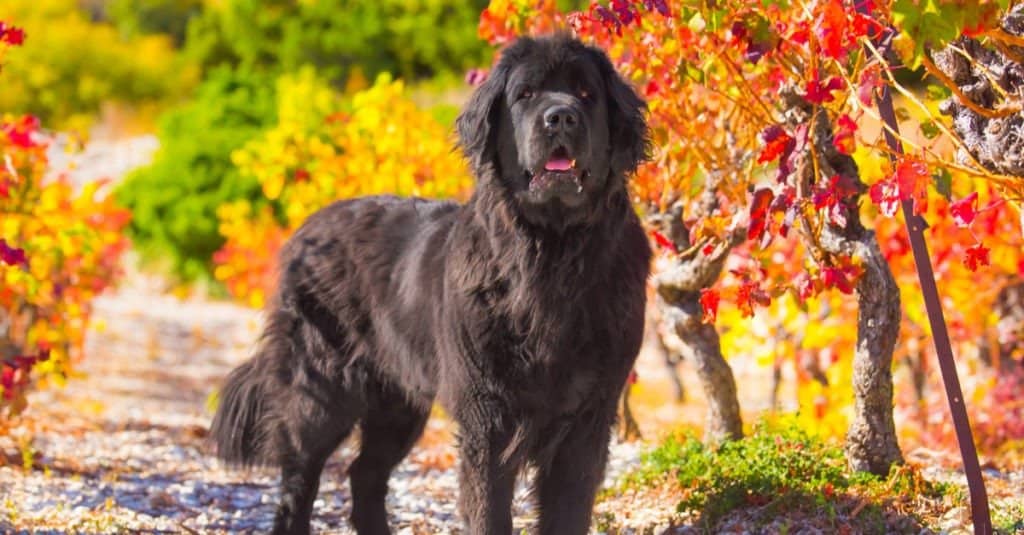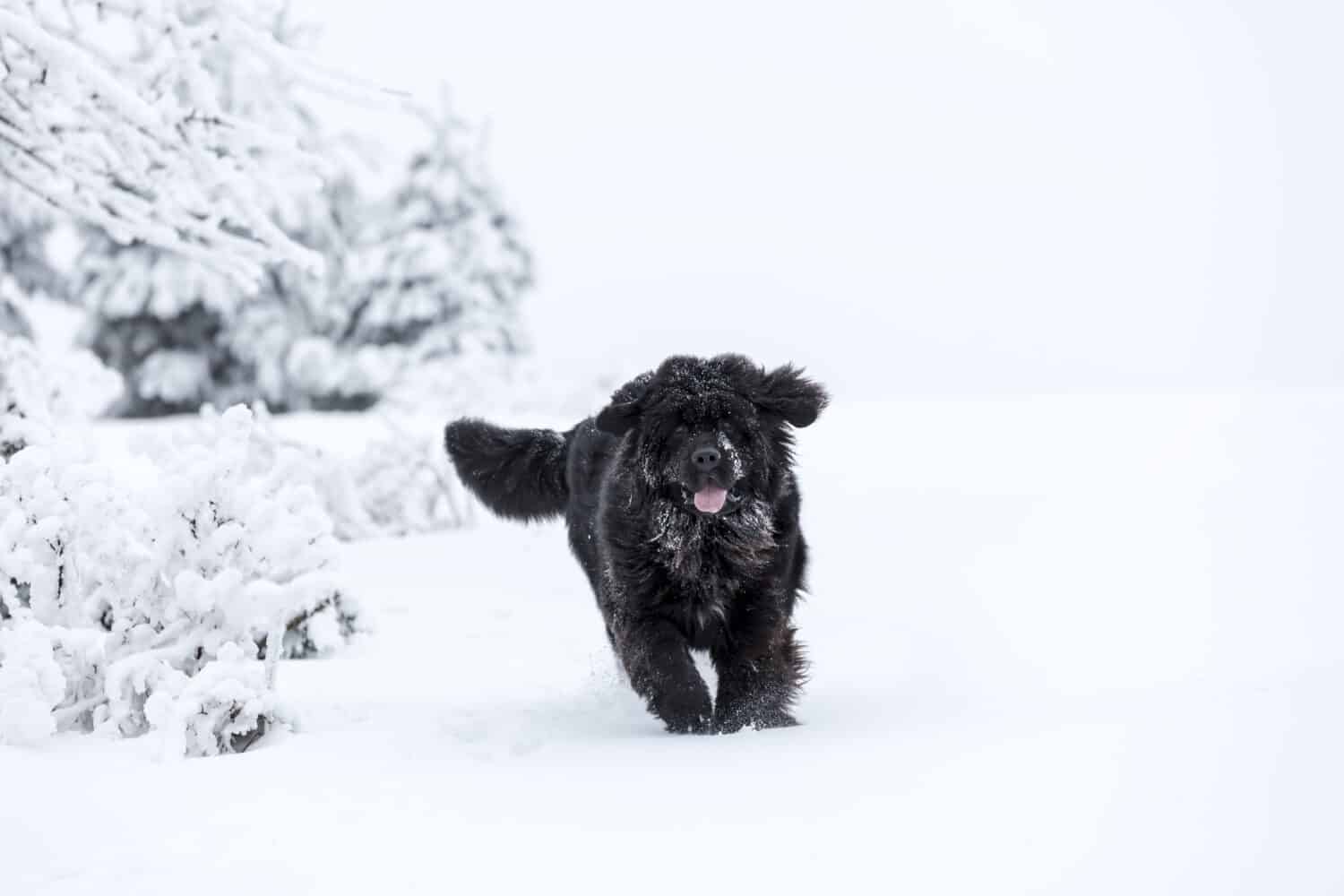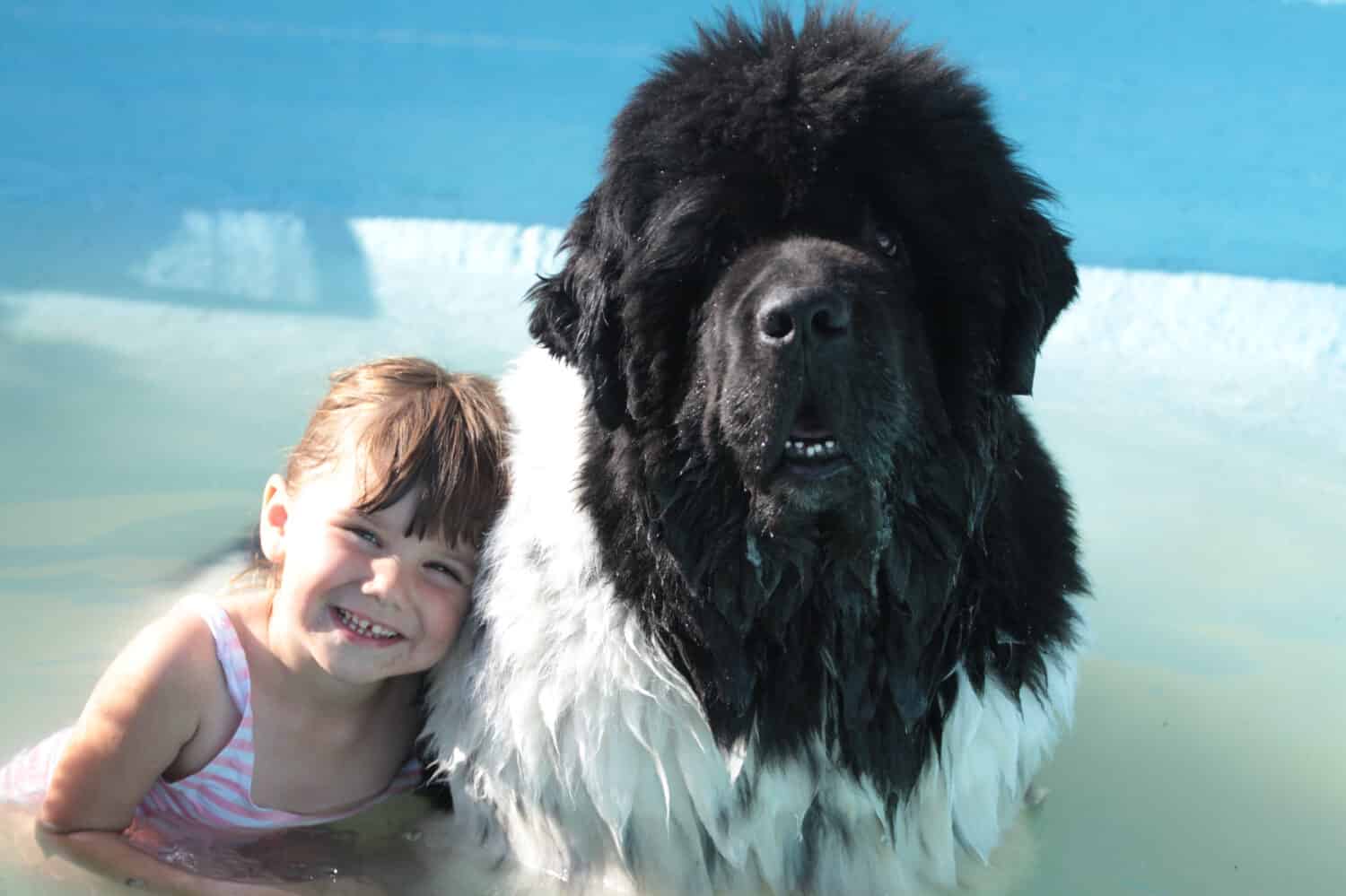
Newfoundland dogs originally come from Newfoundland and Labrador, Canada.
©Pandas/Shutterstock.com
The Newfoundland dog breed comes from the area of Newfoundland and Labrador in Canada. Experts believe they were originally domesticated from wild dogs by the local Algonquin and Sioux tribes. Others believe that European colonizers, who came to the area in the 1600s, mixed their dog breeds with these Native American dogs.
Colonizers originally used Newfoundlands, or Newfies, as they are fondly nicknamed, for hauling carts and fishing nets. They were also trained for water rescues and were common companions on ships. Perhaps most famously, a Newfoundland rescued Napoleon Bonaparte from drowning!
Newfies are a delightfully friendly breed. They are great with children and other animals, and love spending time with their people. They are gentle giants that can grow up to 28 inches high from floor to shoulder and can weigh up to 150 pounds. Even though they are extremely loving and friendly, they can appear intimidating to children and people who are nervous around dogs.
One of the most common questions people have when considering buying a Newfoundland is “How long does a Newfoundland live?” Keep reading to find out.
How Long Do Newfoundlands Live?

Newfoundlands typically live for between nine and 10 years. There are reports of them living as long as 15 years. Some dogs live for as few as eight years.
You can pick a Newfoundland that is more likely to have a longer lifespan by choosing a responsible breeder who does the proper screening for common genetic conditions.
How Old Was the Oldest Newfoundland to Ever Live?
The oldest recorded Newfoundland was Katie Lou Bugum. She lived to be 15 years and nine months old. However, there are anecdotal reports online of people having Newfies who lived to 16 or 17 years old.
Factors That Impact a Newfoundland’s Lifespan
Like many dog breeds, there are several factors that will impact the overall lifespan of a Newfoundland. Some of these factors are applicable to all or most types of dogs, while others are applicable to this breed specifically.
Environment and Setting

Newfoundlands love to play in the snow.
©rzoze19/Shutterstock.com
Where you live can affect how long your Newfie will live. Of course, most people can’t just up and move to accommodate a specific dog breed. However, where you live can influence what type of dog breed you get in the first place.
Newfoundlands tend live longer in colder climates than warmer ones. That is their preferred environment and that is the climate they were bred for. They can typically stand temperatures colder than the ones humans prefer, and love to play and simply sit in the snow.
In general, dogs who live indoors tend to live longer than those who live outdoors. All dogs need plenty of outdoor time, but they live longer when they have a safe, clean, and cozy indoor space to relax. Living outdoors is more stressful for dogs. They are exposed to more extreme weather and other animals that can attack them or spread diseases.
Exercise
All dog breeds need a certain amount of exercise, but the exact amount varies by breed and sometimes by age. Making sure your dog gets the proper amount of exercise can lead to a longer lifespan.
Newfoundlands need about 30 minutes of moderate exercise daily. People usually take their dogs for a hearty walk each day, but Newfoundlands have a love of water, so swimming is also an option for exercise. These work-loving dogs also enjoy playing fetch with a ball or a frisbee. Playing games is a fun way for Newfoundlands to get exercise while building communication skills with their owners.
Proper & Knowledgable Healthcare
Every pet owner needs a trustworthy and knowledgeable veterinarian. Having the right healthcare provider and bringing your dog to the vet once per year for their annual checkup can increase the lifespan of your dog.
Because Newfoundlands are prone to certain health problems, you may want to find a vet that specifically has experience with this breed. There are also vets that specialize in large dog breeds, which could also be a good fit for your Newfoundland. You should also have the number of a 24-hour or emergency vetrinarian clinic on hand in case of any unexpected emergencies.
In addition to proper vet care, you should also give your Newfoundland the right healthcare at home. Follow all vet instructions for care. One surprising thing that can help your Newfie live longer is to brush their teeth regularly. According to some experts this can add years to your dog’s life. Like humans and their teeth, keeping dogs’ teeth healthy can prevent other diseases later on down the road.
Grooming
Newfoundlands require proper grooming. They are prone to getting skin conditions due to their unique grooming requirements. Newfies have a unique double coat that helps to protect their skin like many water faring breeds. You need to brush and comb them weekly, and sometimes more frequently. They also need bathing every six to eight weeks, depending on how dirty they get. If not, they can develop mats in their fur and a skin condition called dermatitis.
Start your grooming practices while they are puppies. They don’t need grooming all that often at this stage of life, but it gets them used to the more intensive brushing they will need as they get older.
Breeding
As with any purebred dog, choosing a responsible breeder is essential. Ethical breeders screen dogs for hereditary conditions. Feel free to ask for references from breeders and be wary of anyone who seems like they are just trying to make a quick buck. Ask about the age of the parents and ask to see photos of the parents and current puppy photos.
Working with the right breeder can take a while. More ethical Newfoundland breeders only have one to two litters available per year, and they are quite discerning about who they give their puppies to. So, don’t get discouraged if it takes a few tries to get your new best friend!
Nutrition
Nutrition is important for all dog breeds. Large dog breeds such as Newfies have special dietary needs to stay healthy. Make sure you feed them a food specific to large breeds. Maintaining your dog at a healthy weight can help to avoid health problems as they age. Your dogs food should include:
- 30% protein
- 9% fat
- 1.5% calcium
- 0.8%-1% phosphorus
Give your dog plenty of water. To find out how much water your dog should drink daily, multiply their weight in pounds by 0.65. The result is the amount of water your dog needs in ounces. Give your dog more than this amount on hot days and after exercise.
Health Conditions
Newfoundlands are prone to several health conditions. Some of them are genetic and can be prevented through proper screening of parent dogs before they are allowed to breed. Others can be managed through medication and vet care if you catch them early enough.
Eye Problems
There are two genetic eye conditions that can affect Newfoundlands — entropion eyelids and ectropion eyelids. These conditions are common genetic defects in several large dog breeds. With entropion, the eyelids invert or roll in.
With ectropion, the eyelids roll out. Both conditions can lead to irritated eyes in dogs and can get worse as dogs get older. If found as a puppy, entropion eyelids can be corrected through a procedure called tacking. As dogs get older, they can have a surgery to correct their eyelids if the condition gets worse. Antibiotics can sometimes help eye irritation caused by these conditions.
This condition can be prevented through screening of parent dogs. Though no official genetic test exists, if a parent dog had one of these conditions, they may pass it on to their offspring.
Heart Problems
Like other large dog breeds, Newfoundlands are prone to a few heart problems. These conditions are usually genetic, so screening by breeders is essential in prevention. Avoiding these conditions can increase Newfoundland lifespan.
- Dilated cardiomyopathy (DCM): With this condition, the heart weakens and can’t pump blood efficiently around the body. Eventually the condition can lead to congestive heart failure.
- Sub-Valvular Aortic Stenosis (SAS): Dogs with this condition have some extra tissue in their heart that makes it have to work harder and can lead to a heart murmur.
Skeletal Problems
Hip dysplasia and elbow dysplasia are two issues that affect many dog breeds. With these conditions, the joints don’t fit together perfectly. Over time, the joints loosen and degenerate, leading to arthritis. This condition isn’t life threatening itself, but it can lead to pain and decreased activity, which can affect the overall lifespan of Newfoundlands.
Newfies are also prone to ACL tears. Experts are not sure if this tendency is genetic or if it is simply due to their anatomy. According to some, waiting until your dog’s growth plates have closed before spaying or neutering can reduce the risk of a torn ACL. Additionally, keeping your dog at a healthy weight can also help to avoid a tear.
Socialization and Love

Make sure to give your Newfoundland dog plenty of love.
©Da Silva Emmanuelle/Shutterstock.com
All dogs need some amount of socialization with people and sometimes other animals. Newfoundlands are especially social dogs. They love their people and do well in families. Make sure to give your Newfoundland plenty of attention by petting them and playing with them to make them happy.
The photo featured at the top of this post is © MartinFredy/ via Getty Images
Ready to discover the top 10 cutest dog breeds in the entire world?
How about the fastest dogs, the largest dogs and those that are -- quite frankly -- just the kindest dogs on the planet? Each day, AZ Animals sends out lists just like this to our thousands of email subscribers. And the best part? It's FREE. Join today by entering your email below.
Thank you for reading! Have some feedback for us? Contact the AZ Animals editorial team.






